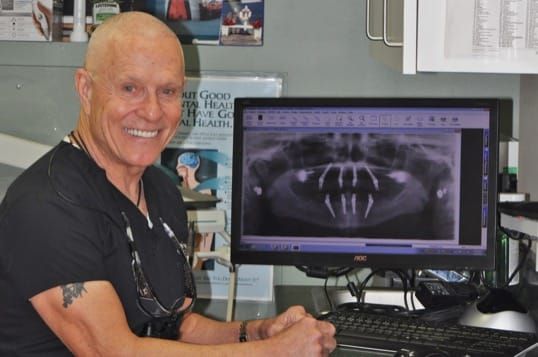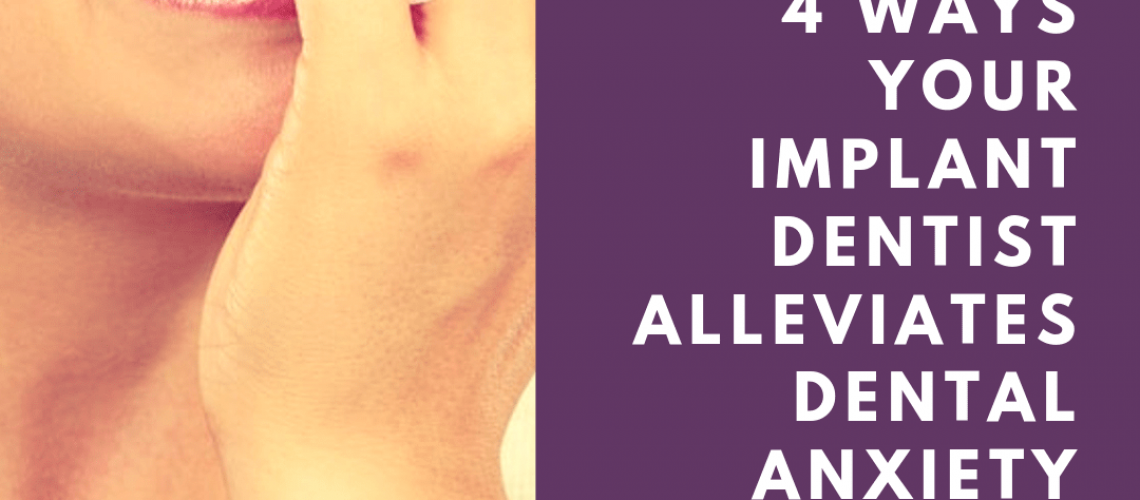Dental anxiety is an unfortunate feeling many people experience when receiving dental treatment. In fact, as many as 9-20% of Americans avoid the dentist entirely because their anxiety is so severe. Dental anxiety can be especially prevalent in patients who are seeking dental implant treatment to restore severely damaged or decayed teeth, as well as teeth that are missing altogether.
While dental implants generally require a slightly more invasive treatment, a good implant dentist will ensure that the patient does not experience additional anxiety or discomfort. This is because many implant dentists undergo specialized training that allows them to more effectively perform implant procedures. Here are four ways that your implant dentist alleviates dental anxiety:

Dental Anesthetics
Pain is one of the leading causes of dental anxiety. Many people have heard “horror stories” of dental pain from their peers and now fear having to experience it themselves. However, a good implant dentist will use the right type and amount of dental anesthetics to ensure minimal discomfort. Dental anesthetics work by blocking nerve signals, essentially causing the affected area to be numb and unresponsive to stimuli. When administered correctly, you may feel pressure, but never pain.

Nitrous Oxide
Nitrous oxide, also known as laughing gas, is an inhaled form of dental sedation that causes feelings of relaxation and euphoria. It is inhaled through a mask that fits over the nose and the effects will last as long as it is being inhaled. With nitrous oxide, you will still be aware of what is happening around you and be able to respond if needed, but you will be in a completely relaxed state. One bonus of nitrous oxide is that the sedation effects will fade as soon as the gas is no longer being inhaled. This means that you can drive yourself home after the procedure. Additionally, nitrous oxide generally does not require any fasting prior to being sedated.


Oral Sedation
Another method used to ease your dental anxiety during an implant procedure is oral sedation. This method uses a sleeping pill that is taken the morning of the procedure. In some cases, it can also be taken the night before as well. Oral sedation offers a stronger level of sedation than nitrous oxide and may even put you into a light sleep. However, because it is a stronger sedation method, you are required to have someone drive you home and fast prior to your procedure.

IV Conscious Sedation
If you have severe dental anxiety, this may be the best dental sedation method for you. IV sedation is received through the vein and is the strongest and fastest-acting sedation method. Although you will be conscious, you may drift in and out of a twilight sleep and you will be completely unaware of what is happening around you. Additionally, you will have no memory of what happened while you were out. However, IV conscious sedation does require someone to drive you home, as well as fasting prior to the procedure.
Dental anesthetics, nitrous oxide, oral sedation, and IV conscious sedation are four different ways your implant dentist will alleviate your dental anxiety during an implant procedure.Dental anesthetics neutralize one of the top causes of dental anxiety, while the other three sedation methods reduce or eliminate the feeling of anxiety itself. With the right combination, your implant dentist hopes to provide you with a pleasant and relatively painless implant procedure. To learn more, see “Dental Sedation”.

Dr. Gregory J. Young is a Diplomate and board certified by the American Board of Oral Implantology/Implant Dentistry. He is also an Associate Fellow of the American Academy of Implant Dentistry. Additionally, he provides education, training and mentoring to his colleagues in all phases of implant dentistry. He has over 37 years of experience and dedicates his practice solely to implant dentistry and training.




